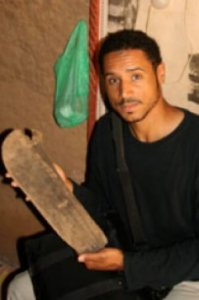Presented By: Eisenberg Institute for Historical Studies
EIHS Lecture: "Visionaries: Second Sight and Social Change in West Africa Since 1800"
Rudolph Ware, University of Michigan

Oxford’s Advanced Learners Dictionary gives the following two primary definitions of the term "visionary":
1. original and showing the ability to think about or plan the future with great
imagination and intelligence
-a visionary leader-
2. relating to dreams or strange experiences, especially of a religious kind
-visionary experiences-
This talk explores—in the context of Islamic West Africa—these two primary (and inter-related) senses of the meaning of the word "visionary": a person who experiences "visions" in dreams, trances, and waking states and a person who provides inspirational leadership for social change. In short, it is an examination of the relationship between the "extra-sensory" sensorium of religious experiences and social action in the Islamic tradition of the African West. For African Muslim visionaries "visions" were often more real than reality itself and thus had the capacity to transform it. But these visions were not limited to seeing; they were also experiences of sound and smell, touch and taste. The English language—which favors sight among its five culturally constructed senses—offers no word better to describe such all-encompassing sensory experiences than "vision."
Rudolph Ware is an associate professor of history at the University of Michigan. Specializing in premodern West African history, Professor Ware's research interests include Islam, popular religious culture, and race. His book, The Walking Qur’an Islamic Education, Embodied Knowledge, and History in West Africa (2014), interrogated the role of Islamic education in shaping Muslim identities, and examines the ways in which Qur’anic schools have articulated with Sufi orders, Muslim reformers, and the state in the recent past.
Free and open to the public.
This event is part of the Thursday Series of the Eisenberg Institute for Historical Studies. It is made possible by a generous contribution from Kenneth and Frances Aftel Eisenberg.
1. original and showing the ability to think about or plan the future with great
imagination and intelligence
-a visionary leader-
2. relating to dreams or strange experiences, especially of a religious kind
-visionary experiences-
This talk explores—in the context of Islamic West Africa—these two primary (and inter-related) senses of the meaning of the word "visionary": a person who experiences "visions" in dreams, trances, and waking states and a person who provides inspirational leadership for social change. In short, it is an examination of the relationship between the "extra-sensory" sensorium of religious experiences and social action in the Islamic tradition of the African West. For African Muslim visionaries "visions" were often more real than reality itself and thus had the capacity to transform it. But these visions were not limited to seeing; they were also experiences of sound and smell, touch and taste. The English language—which favors sight among its five culturally constructed senses—offers no word better to describe such all-encompassing sensory experiences than "vision."
Rudolph Ware is an associate professor of history at the University of Michigan. Specializing in premodern West African history, Professor Ware's research interests include Islam, popular religious culture, and race. His book, The Walking Qur’an Islamic Education, Embodied Knowledge, and History in West Africa (2014), interrogated the role of Islamic education in shaping Muslim identities, and examines the ways in which Qur’anic schools have articulated with Sufi orders, Muslim reformers, and the state in the recent past.
Free and open to the public.
This event is part of the Thursday Series of the Eisenberg Institute for Historical Studies. It is made possible by a generous contribution from Kenneth and Frances Aftel Eisenberg.